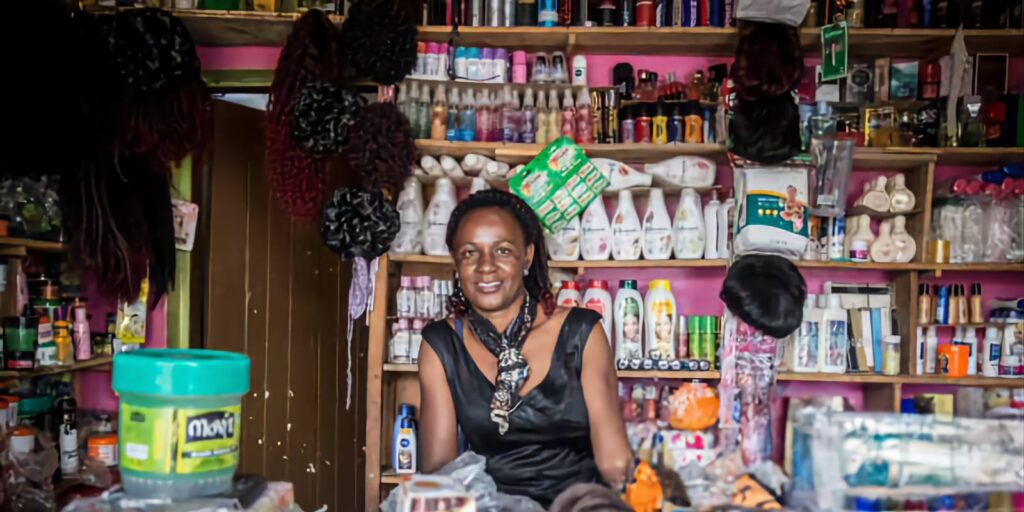In the bustling streets of Kenya, nestled among the vibrant markets, thrives a small-scale trader with a knack for importing cosmetic treasures. Meet Sarah, a resilient entrepreneur whose journey unveils the intricate tapestry of Kenya’s trade dynamics, interwoven with Uganda’s rich offerings in haircare, skincare, and boutique products.
Kenya and Uganda have shared a longstanding business rapport, evident in the substantial recorded
remittances of $321.24 million 1 from Kenya to Uganda in 2022. Uganda’s niche lies in reasonably priced,
high-quality cosmetic goods. The total export value of cosmetic products from Uganda to Kenya stood at
an estimated $5.03 million 2 in 2020.
Sarah, a shrewd trader, harnesses the power of social media platforms like Facebook Marketplace,
WhatsApp, and Instagram. Leveraging their business-oriented features, she strategically places and
boosts ads, widening her reach to potential customers. With 48% 3 of Kenyans making online purchases,
these platforms have become pivotal in her business expansion.
Facilitating transactions seamlessly is M-Pesa, an indispensable tool for Sarah and Kenya’s 30 million 4
users. With a staggering 26 billion 5 transactions in the year ending March 2023 and a transaction volume
of 35.86 trillion Kenyan shillings, M-Pesa’s recent increased limit from 150,000 to 250,000 shillings 6
further amplifies its significance in business and personal transactions.
However, amid her triumphs, Sarah, like many micro and small-scale enterprises (MSEMs), faces
numerous challenges. Kenya’s high inflation rate, surging to 6.92% in October 2023 from the previous
year, casts a shadow over business operations. The steep rise in excise duty tax on cosmetic products,
currently standing at 15%, up from 10% 7 , adds to the financial strain.
Financial institutions imposing soaring interest rates, presently at 13.82% 8 on bank loans, have
prompted traders like Sarah to seek alternative lenders. Safaricom’s M-Shwari, offering loans at 9% and
the government’s Hustler Fund with an attractive 8% per annum, albeit limited loan amounts, have
emerged as viable options.
Navigating the bureaucratic landscape, Sarah encounters hurdles in business registration via the eCitizen
platform. Challenges, including the platform’s exclusivity to English, navigation complexities, and
restricted access via mobile devices, hinder her seamless engagement with government services
centralized on the platform.
ECitizen, envisioned to streamline government services from business registration to passport
applications, presents barriers that resonate with many MSMEs in Kenya.
Sarah’s journey epitomizes the resilience of Kenyan traders navigating a landscape defined by both
opportunities and obstacles. As she adapts to evolving trade dynamics and embraces technological
advancements, her determination to thrive remains unwavering, echoing the spirit of countless MSEMs
shaping Kenya’s entrepreneurial landscape.
1 https://www.centralbank.go.ke/diaspora-remittances/
2 https://tradingeconomics.com/uganda/exports/kenya
3 https://www.ca.go.ke/
4 https://www.citizen.digital/business/kenyans-transacted-ksh36-trillion-on-m-pesa-last-year-n319547
5 https://www.safaricom.co.ke/media-center-landing/press-releases/safaricom-gets-approval-to-increase-m-pesa-
transaction-limits-to-ksh-250-000
6 https://kra.go.ke/helping-tax-payers/faqs/excise-stamps-on cosmetics#:~:text=What%20is%20the%20rate%20of,duty%20charged%20to%20be%20paid%3F
7 https://tradingeconomics.com/kenya/bank-lending-rate

